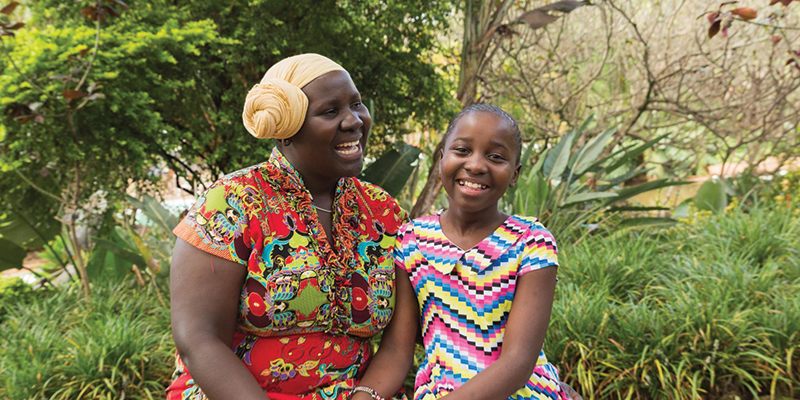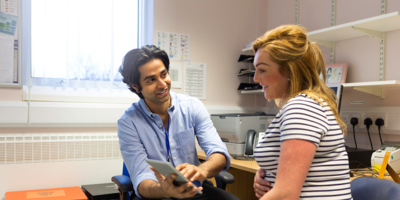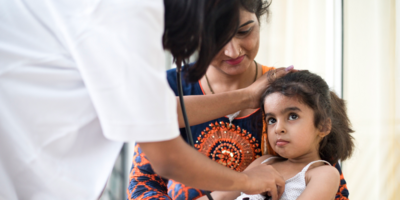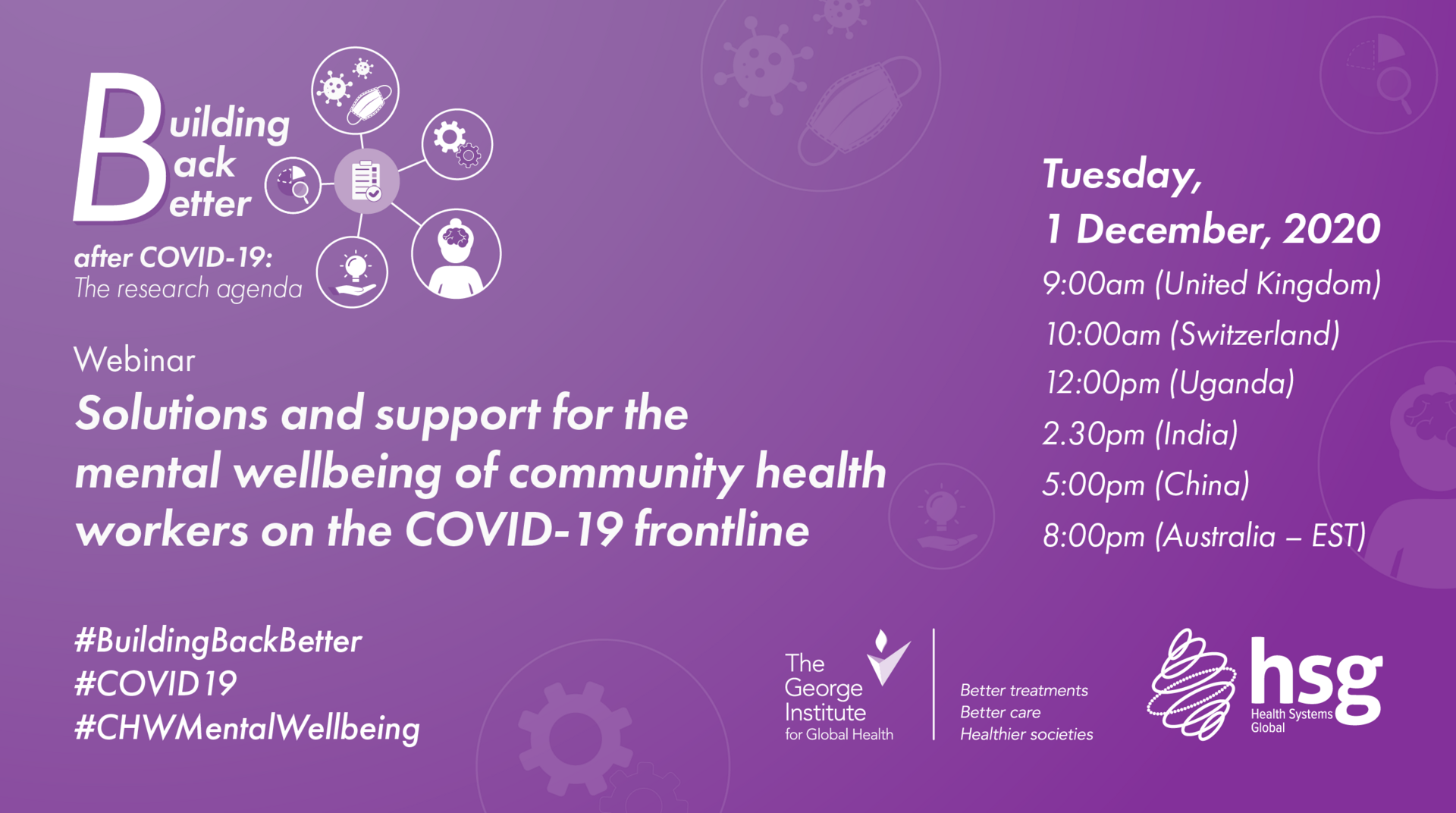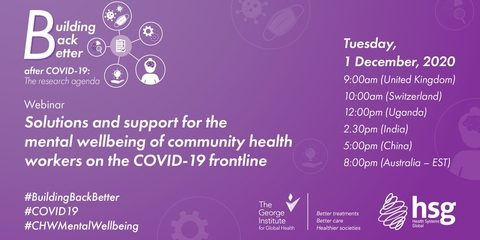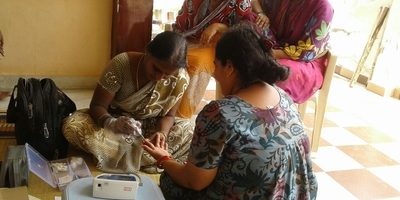The number of people living with diabetes is increasing worldwide at an alarming rate. According to the International Diabetes Federation (IDF), diabetes is one of the fastest growing health challenges of the 21st century, and projected numbers are consistently being surpassed.
The people hit hardest by this condition are from low- to middle-income countries. If current trends continue, 700 million adults will have diabetes by 2045. Yet there are opportunities, all over the world, to aid in prevention and avoid progression to other diseases such as kidney disease.
At The George Institute for Global Health, we understand that tackling diabetes is a critical and achievable goal. Innovation is necessary to ensure this is possible. That’s why we have a range of projects underway to approach the challenge in a number of ways, including developing accessible monitoring systems, innovative management practices, affordable treatments, food policy initiatives, research to learn more about risk factors and collaborations to consider multimorbidity.
Accessible monitoring systems
Evidence shows that regular monitoring of diabetes complications risk factors, such as blood glucose levels and blood pressure, can help reduce hospitalisations and improve clinical outcomes. However, not everyone has access to reliable monitoring systems, particularly in remote areas and/or low- and middle-income countries.
In China, health system infrastructure is struggling to meet the gaps in diabetes care and management and innovative solutions are needed. One potential solution is to incorporate state-of-the-art mobile technology to improve self-management support and build the capacity of family members to provide high-quality care at home. SMARThealth Diabetes aims to provide improved care and management for patients with type 2 diabetes mellitus using innovative mobile technology.
Evolving care practices
Diabetes mellitus is one of the most important causes of death and disability contributing to a significant proportion of healthcare expenditure in India. Primary health centres are the first level of contact for management of patients with diabetes, but for people needing treatment they are not always an attractive option because of barriers such as the distance required to travel, uncertainty regarding the availability of doctors, and cost in terms of loss of wages while away to receive treatment.
The IMPACT Diabetes study proposes the development and evaluation (of the feasibility, acceptability and preliminary effectiveness) of a novel diabetes management program used by non-physician healthcare workers on an innovative technology platform (a clinical decision support system (CDSS)) for the early detection of diabetes, management and prevention of its complications in individuals aged 30 or above.
Addressing the burden of diabetes during pregnancy
1 in 7 births are affected by gestational diabetes (the experience of diabetes during pregnancy). Of these, the vast majority of cases experiencing diabetes-related hyperglycaemia (an excess of glucose in the blood) are in low- and middle-income countries where access to maternal care is often restricted. In a recent seminar Senior Research Fellow Dr Jane Hirst discussed the global burden of gestational diabetes and associated challenges in its management during pregnancy and after birth. The presentation featured new approaches to addressing this burden, including the novel adoption of digital monitoring and machine learning techniques.
Women with gestational diabetes are at a high-risk of getting type 2 diabetes. Our LIVING study is examining whether an education intervention, using the existing workforce, can help prevent diabetes amongst women who have gestational diabetes mellitus in India, Sri Lanka and Bangladesh. The GACD funded study brings together educators, psychologists or social workers, depending upon the health system, to educate these women about lifestyle, diet, exercise, and how to prevent type 2 diabetes.
Food Policy
According to IDF DIABETES ATLAS Ninth edition 2019, ‘The cornerstone of type 2 diabetes management is the promotion of a lifestyle that includes a healthy diet, regular physical activity, smoking cessation and maintenance of a healthy body weight’.
The George Institute has a number of food policy initiatives to improve nutrition and help fight obesity. The FoodSwitch mobile App is available in 10 countries and empowers consumers to make better food choices by providing simple health information on a scanned product and suggesting healthier alternatives to 'switch' to.
In Australia the Australian federal government has endorsed the Health Star Rating scheme – a front of pack labelling system which ranks the healthiness of packaged foods. The George Institute has been reviewing these standards and offering recommendations to improve accuracy and understanding. Read more.
Another project advocating for healthy lifestyle is Action on Salt China (ASC) to improve healthy living by reducing people’s intake of at home, at work and in eating out, across the whole of China. Professor Puhong Zhang, China Director of ASC said, “We will develop and implement a comprehensive, effective and sustainable national salt reduction program targeting various salt intake paths, with the goal of achieving a 15% reduction by 2021 and 30% reduction by 2025."
Understanding new risk factors
In early 2020 a study in Australian adults with diabetes by researchers at The George Institute suggests 1 in 20 people will develop kidney disease each year and that this increases to 1 in 4 each year in people aged 85 years and over. With an ageing population these findings have an important flow on effect on health systems.
Researchers found that in addition to the known risk factors for kidney disease such as age, high blood pressure and obesity, having a history of cancer also increased the risk of developing the disease. Read more
Investigating the relationship between diabetes and infection
With the burden of diabetes increasing among people living in low- and middle-income countries, the incidence of deaths due to infection in hospitals are also on the rise. However, not much research has been done to evaluate the multimorbid relationship between diabetes and infection.
“The major burden of diabetes is now being felt in low- and middle-income countries where the incidence of diabetes is increasing rapidly. Diabetes accelerates susceptibility to infection and exacerbates outcomes for other infectious diseases like tuberculosis, melioidosis and dengue” said Professor Vivekanand Jha, Executive Director of The George Institute in India. The George Institute for Global Health India in collaboration with Oxford University has launched a unique diabetes and infection network to explore how real-world data sets can be used to evaluate the relationship between diabetes and infection in low and middle-income countries. Read more here
Revolutionary treatments for slowing progression of chronic kidney disease
Around half a billion people worldwide have diabetes and up to 40% will go onto develop kidney disease. The CREDENCE trial identified the first new drug therapy in more than 15 years for slowing down the progression of chronic kidney disease (CKD) in patients with type 2 diabetes and offers hope for hundreds of millions of people with diabetes worldwide.
The drug canagliflozin was developed to lower glucose levels for people with diabetes and through CREDENCE trial has been shown to protect against kidney failure. It also significantly reduced the risk of cardiovascular complications including heart failure, which are common among people with kidney disease. The results, published in the New England Journal of Medicine, also showed heart failure was reduced by over 30%, and major cardiovascular events by about 20%.
Read more about CREDENCE and related trials here
Life-saving treatment that doesn’t cost the earth
There is a growing epidemic of type 2 diabetes worldwide, driven by obesity, inactivity and poor nutrition. The WHO reports that one in 11 adults has diabetes – around 422 million people. Diabetes caused 1.6 million deaths in 2016.
Many diabetics develop kidney disease. According to the US Kidney Foundation approximately 30 percent of patients with Type 1 (juvenile onset) diabetes and 10 to 40 percent of those with Type 2 (adult onset) diabetes will develop signs of kidney disease. Between 5 and 20% of diabetic patients go on to require dialysis treatment – the number varies from country to country, depending in part on the availability of this life saving but expensive treatment.
Research by The George Institute published in The Lancet showed that in 2010 between 5 and 10 million people in the world needed dialysis for terminal kidney failure, but only 2.6 million had access to it, mostly due to cost – the rest die a preventable death. Most of these preventable deaths occurred in China, India, Indonesia, Pakistan and Nigeria. That research predicted the global need for dialysis will double by 2030.
Dialysis has been available for more than 60 years however until recently has been no great leap forward in its design or cost, making it unaffordable and inaccessible to most who need it. Our world first affordable and portable dialysis system, being developed by Ellen Medical (an initiative of The George Institute) will prevent millions of people dying unnecessarily because they cannot access treatment, especially in low- and middle-income countries. Costing under $500 to build and $5 a day to run, the Ellen Medical Dialysis System is a breakthrough in low-cost technology that will improve dialysis management and patient outcomes.
The first affordable dialysis is part of a pipeline of innovative, scalable solutions being developed by George Health, to address chronic diseases in underserved populations. George Health was established by The George Institute to harness the power of commercialisation to develop and scale-up innovations arising from the Institute’s research and expertise. Other areas of focus of George Health include innovative multidrug treatments for several conditions including hypertension, diabetes and heart disease, and technologies to improve primary care for people with common serious conditions in low- and middle-income countries worldwide.
-------------
The George Institute for Global Health believes that tackling diabetes is a critical and achievable goal, and that innovation is necessary to ensure this is possible. What is included above is a small sample of the wide variety of projects underway globally to aid in understanding, prevention and avoid progression.

